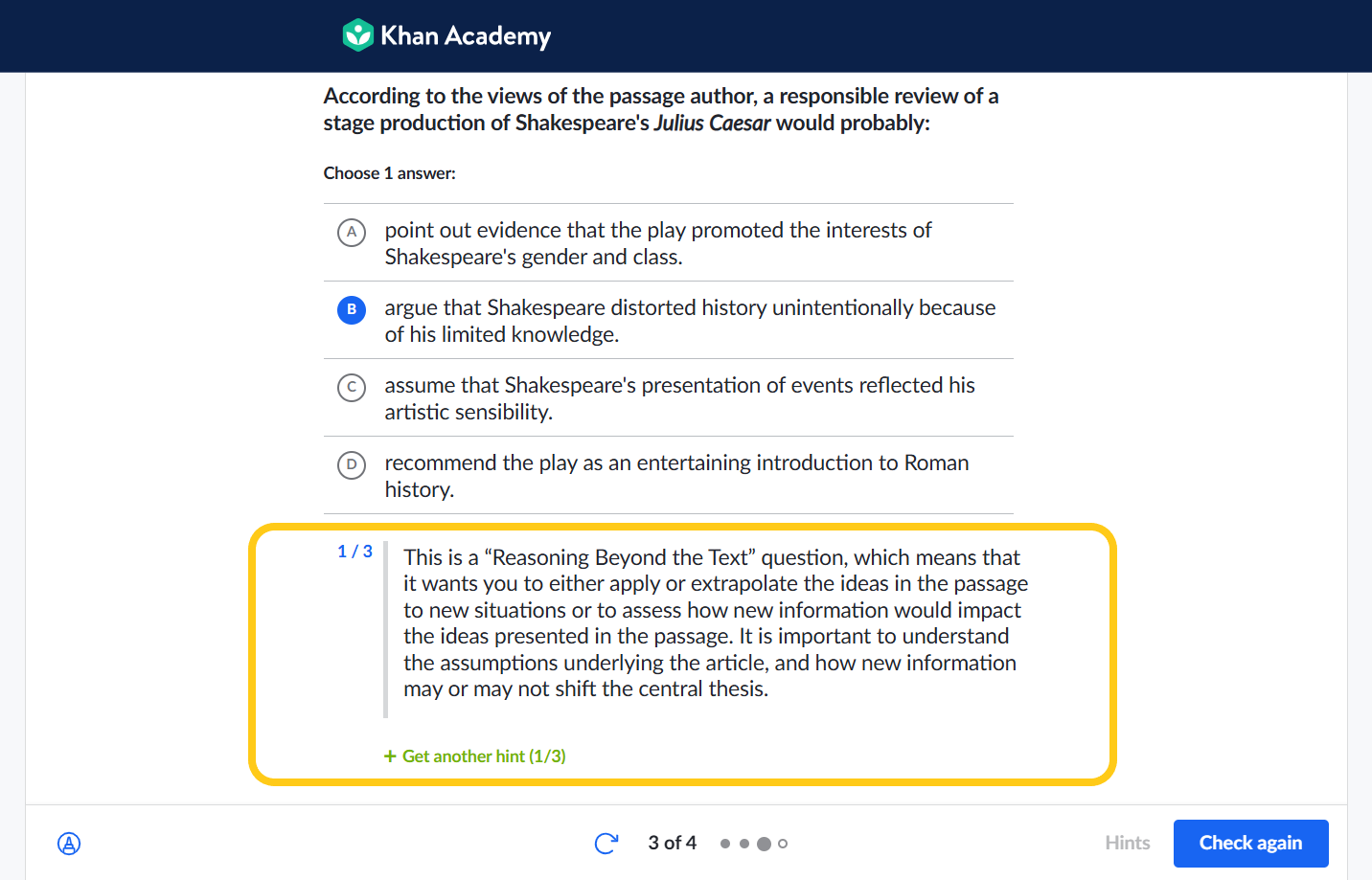Best Way to Study for MCAT CARS (According to Reddit)
By Dr. Sarah Johnson • Updated 10/6/2025
Struggling to improve your MCAT CARS score can feel overwhelming and frustrating, especially with so many conflicting study methods out there.
If you’ve faced difficulty understanding complex passages or managing time, you’re not alone.
This article reveals the best way to study for MCAT CARS, based on Reddit’s most effective strategies, helping you boost your score with confidence and clear direction.
Uncover the best way to study for MCAT CARS, straight from students who’ve been there and crushed it.
Understanding The CARS Section
The Critical Analysis and Reasoning Skills (CARS) section of the MCAT is designed to test your ability to comprehend, analyze, and evaluate complex passages, primarily from the humanities and social sciences.
Unlike the other MCAT sections, CARS does not require any outside content knowledge - everything you need to answer the questions is in the passage itself.
The passages cover diverse topics from the humanities (literature, philosophy, ethics, art, religion, etc.) and social sciences (history, economics, psychology, sociology, etc.), but students do not need prior knowledge of these fields.
Each passage is followed by 5-7 questions that assess your reasoning, not your memory.
You must extract and analyze the key information from each passage. You’ll need to identify main ideas, understand the author’s tone and intent, evaluate arguments, and draw inferences.
The questions themselves fall into three main categories:
-
Foundations of Comprehension (~30%): Tests literal understanding of passage details and overall meaning.
-
Reasoning Within the Text (~30%): Asks you to combine information from multiple parts of the passage to draw conclusions.
-
Reasoning Beyond the Text (~40%): Requires applying or extrapolating passage ideas to new situations or broader contexts.
With 9 passages and 53 questions total, time management is critical; you’ll have just 90 minutes to complete the section, which boils down to about 1.6 minutes for each question.
CARS is often seen as the most unpredictable and challenging part of the MCAT, which is why finding the best way to study for MCAT CARS is essential.
Most test-takers find CARS challenging because it requires quick, careful reading of abstract topics and precise inference.
CARS mastery involves more than just reading comprehension of complex, often thought-provoking pieces of writing with sophisticated vocabulary. It demands active, critical thinking under time pressure.
Analyzing Top CARS Study Strategies By Top Scorers From Reddit
Successful CARS students emphasize active, purposeful reading and consistency.
Here are some of the top-rated, high-value, efficient tactics Redditors who scored well on MCAT CARS consistently recommend:
- Strategic Active Reading.
Read with full concentration on understanding, especially at first. Many top scorers advise reading slowly and meticulously at the start to grasp the central argument.
For example, reviewing the first sentence of each paragraph very slowly helps “set the tone” and reveal the main idea. Continuing carefully through the passage ensures you catch arguments rather than skimming past crucial shifts.
- Engagement and Visualization.
High scorers often mentally engage with the passage.
One compiled Reddit tip is to “visualize everything you read” and even “read with passion,” treating the content like a story or movie. This emotional involvement makes details stick; it helps you internalize the author’s tone and argument.
In practice, imagine the scenarios or characters described so you remember them, and listen for the author’s attitude (positive, negative, neutral) as you read.
- Identify Signal Words and Support.
Elite scorers pay attention to transition and contrast words (e.g., “but,” “however,” “yet”) as signals of shifts in the author’s point.
Noticing these cues highlights when a new idea or counterpoint appears. At that point, the preceding idea may be less important than what follows.
Similarly, look for support indicators: if the passage elaborates on a point, provides concrete examples, or cites authorities or evidence, that often marks a significant concept.
Recognizing these signals helps pinpoint the main arguments and avoid getting distracted by minor details.
- Main-Idea Summaries.
Some scorers recommend succinctly summarizing each paragraph in your own words. Jack Westin, for example, suggests distilling a paragraph to a 3-4 word summary to capture its gist.
This practice keeps you focused on the core message and speeds up answering questions. In fact, formulating a quick phrase for each paragraph trains you to see the forest for the trees.
- Consistency of Strategy.
A common lesson is to choose a strategy that works for you and stick with it. As one expert notes, every high scorer has an implicit strategy (even if they didn’t realize it).
Switching methods mid-test can introduce confusion.
For broader study planning, integrate CARS practice with MCAT study plan builders to create a structured prep foundation. If you’re on a tight timeline, check out our 1-month MCAT study schedule which includes daily CARS practice recommendations. You can also use Anki for CARS review to reinforce reasoning patterns through spaced repetition.
Once you find effective routines (such as summarizing questions, using elimination techniques, etc.), make them habitual during practice and consequently, on exam day.
- Daily, Timed Practice.
Forum veterans stress gradual buildup of passage endurance.
For example, one student reported doing one passage every day, plus a longer session (3–5 passages in a row) once a week to build stamina. Over weeks of practice, this makes reading and answering MCAT-style passages feel “second nature”.
The key is consistent exposure. Frequent practice under similar conditions (timed passages) lets you discover patterns, inch up speed, and gain confidence.
Overall, combining these tactics - focused reading, active engagement, attention to structure, and steady practice - is what top scorers on Reddit and elsewhere attribute their success to.
Best CARS Practice Resources
Quality practice materials are crucial.
- AAMC CARS Resources
The official AAMC resources should be the foundation, since they are closest to the real exam. AAMC offers:
-
CARS Question Pack 1 & 2 (120 mixed passages and discrete questions each). Each CARS question pack covers humanities and social science passages. These are somewhat easier than real MCAT questions, but are still valuable for practice.
-
CARS Diagnostic Tool (includes ~28 passage sets). Comes with built‑in analytics and official answer explanations directly from the test makers.
-
Official Practice Exams - useful for full test simulation.
- Jack Westin CARS daily passages
Many students find Jack Westin’s Free Daily Passages extremely helpful.
Jack Westin publishes a new passage and question set every day, covering a range of topics, including CARS. It’s a great way to get regular, low-stakes practice.

However, be aware that some answers on Jack Westin may use slightly different reasoning than AAMC. Therefore, treat these passages as timing practice rather than final authority.
- Khan Academy
The Khan Academy MCAT section question banks contain free passages created in collaboration with AAMC.

While the test interface isn’t MCAT-like, these free CARS practice passages are good for untimed practice and initial exposure. For a complete compilation of free MCAT resources including Khan Academy and other practice materials, check out our guide to the best free MCAT resources.
- UWorld MCAT Question Bank
This paid resource is widely praised for having challenging CARS passages and very detailed explanations.
A UWorld subscription gives access to thousands of MCAT questions (both passage and discrete) and allows custom, timed practice.
For supplemental memorization support, explore Anki decks for MCAT to reinforce key concepts alongside passage practice.
Bottom Line:
Overall, prioritize official content first (AAMC Question Packs, full-length exams), then add high-quality unofficial practice.
As one high-scorer notes, Jack Westin is great for timed practice (and it’s free!), but remember that official AAMC questions are the gold standard for understanding real CARS logic.
Blend a variety of practice, but weigh your study towards materials that best mimic the actual test.
More CARS Tips From High Scorers
Students who excel in CARS often share similar advice on approach and mindset:
- Stay Positive and Trust Your Prep.
A confident, calm mindset on test day makes a difference.
High scorers emphasize that you can improve your CARS score with discipline. As one premed who jumped from 125 to 128 cautions, it will “take a flip in perception or tactic” in how you approach passages, along with disciplined daily practice.
Going into the exam with anxiety will only slow you down - remember that confusion often comes from overthinking.
Stick to your strategy consistently, even if a passage feels strange.
- Active, Focused Reading Strategy.
Summarize and engage with the passage as you go. For each paragraph, strive to capture its main idea (Jack Westin suggests a 3-4 word summary).
Ask yourself after reading a paragraph, “What is the author saying here?” This habit ensures you don’t miss the big picture.
For comparison, explore MCAT physics study methods to see how analytical skills apply across different MCAT sections.
While reading, highlight sparingly - focus only on names, dates, or key terms that stand out, not every detail. Be careful not to highlight everything, as that can clutter your notes.

- Minimal but Strategic Note-Taking.
Some students write quick “roadmaps” or notes for each paragraph. However, many experts warn against overdoing it.
One guide notes that writing a full passage map or lengthy notes may be tempting, but it simply spends too much time on the wrong thing.
Instead of filling the scratch paper, just create a brief mental outline of the author’s arguments.
If you do write anything, keep it to the essential points only – later you can refer back if a question needs specific detail.
- Answer Questions Methodically.
Develop a consistent approach to answering.
Jack Westin recommends first rephrasing what the question is asking in your own words before looking at the choices. (Many low-scorers are tripped up by misreading the question.)
Eliminate clearly wrong answers quickly, and always rely on evidence from the passage. If unsure, apply test-taking tactics like eliminating extreme choices or using the process of elimination.
Above all, avoid changing answers unless you find a clear mistake or oversight. High scorers often stick with their initial logical choice unless proven wrong.
- Time Management and Pacing.
On the real MCAT, CARS allows about 10 minutes per passage (90 minutes/9 passages).
In practice, many coaches suggest trying to read a passage in ~3-4 minutes and spend ~6-7 minutes on the questions.
Consistent timed practice is key.
For example, Bootcamp recommends gradually adding timing pressure once you have accuracy. Aim to answer each passage in under 10 minutes, and work up to completing 9 passages in 90 minutes.
Training with sets of 3-5 passages at a time (as one student did weekly) builds the endurance to maintain speed through the section.
Finally, if a question has you stuck, mark it and move on; you can return if time permits. Top scorers stress not getting bogged down on one question lest you run out of time elsewhere.
By combining these tactics - engagement with the text, strategic note-taking, and disciplined pacing - high scorers find themselves answering more efficiently and confidently on test day.
Troubleshooting Common MCAT CARS Problems
Many students hit similar roadblocks in CARS prep.
Here are solutions to the most common:
- Complex, Dense Passages.
If you struggle with convoluted writing or vocabulary, build your reading stamina gradually.
Read varied humanities/social science material daily: for example, newspaper editorials, history or philosophy essays, or literature. Over time, unfamiliar topics become easier to parse.
Work on vocabulary by learning common Latin/Greek roots or new words as you go.
Remember, with CARS, every answer is in the passage. As the AAMC reminds us, we don’t need outside knowledge. Focus on understanding the passage itself.
When working on practice passages, underline or circle complicated terms and see if you can guess their meaning based on context alone (the surrounding sentences).
- Difficult Inference and Implication Questions.
Questions that require reading between the lines can be tough.
When a question asks “what follows” or “what can be inferred,” slow down and refer to multiple parts of the passage. Look back at any line references given.
Make sure the correct answer choice has solid support in the text or logical extension of it.
To boost inference skill, do targeted practice: take a passage and for each answer choice, point to explicit lines that justify or rule it out.
Over time, you’ll learn how much interpretation vs. literal content each question requires.
- Running Out of Time.
Time pressure is a frequent complaint. The cure is systematic pacing practice.
Gradually train yourself to finish under timed conditions by simulating the exam environment. As mentioned, aim for the ~10-minute-per-passage pace.
If you constantly feel rushed, break practice into tiers: first, do single passages without timing to nail comprehension; then add timing and practice multiple in a row.
Also, mind your test strategy: don’t get stuck rereading the passage for every question. Train yourself to read a passage only once or twice and trust your annotations/notes.
In general, speed will come naturally as you internalize the reading strategies from above; avoid sacrificing accuracy at first for the sake of speed.
Bottom Line:
In summary, identify the specific obstacle (e.g., vocabulary, inference logic, pacing) and tackle it through focused drills.
-
For vocabulary, set aside 10-15 minutes a day on new words.
-
For inference troubles, review answer explanations to see the reasoning.
-
For timing issues, increase the number of passages done consecutively.
Each problem can be improved with targeted practice and time. Remember that CARS preparation also sharpens critical thinking - an asset well beyond the MCAT.
Conclusion
Mastering the MCAT CARS section requires a balanced combination of strategy, practice, and perseverance.
We’ve seen that top scorers invest in active reading strategies - reading closely with purpose, visualizing content, and summing up main ideas - and build confidence through consistent practice.
The right resources (official AAMC materials, Jack Westin, UWorld, etc.) combined with disciplined timing drills can dramatically improve your CARS performance.
Above all, approach CARS prep as an opportunity to hone critical analysis and comprehension skills - abilities that will serve you in medical training and clinical life as much as on the exam.
Stay steady, trust your strategy, and remember that improvement comes with every well-practiced passage.
With focus and practice, you can master MCAT CARS!
Appendix: Additional CARS Resources
Recommended Reading: To strengthen your reading skills, immerse yourself in challenging humanities and social science texts.
Examples include:
-
Acclaimed nonfiction (e.g., Sapiens by Yuval Noah Harari, Guns, Germs, and Steel by Jared Diamond).
-
Classic literature (e.g., George Orwell, Toni Morrison, Kazuo Ishiguro)
-
Essays in The Atlantic, The Economist, or Scientific American.
-
Philosophy or history books.
-
Well-written magazine articles.
The key is breadth: the more you read on diverse topics (religion, art, economics, psychology, etc.), the more comfortable you become with the diction and structure of MCAT passages.
Many students recommend free reading portals like Project Gutenberg or library e-resources to find complex texts.
Online Tools & Communities: Leverage both free and paid study aids.
In addition to practice passages (Jack Westin, Khan Academy, UWorld, AAMC), consider joining MCAT-focused forums and study groups for motivation and tips.
Subreddits like r/MCAT and r/premed have active communities sharing advice and materials.
Student Doctor Network and Premed 101 Forums also have discussions dedicated to CARS strategies.
Some online platforms (MCAT Self Prep, Khan Academy MCAT channel) offer videos on CARS tactics. If budget allows, paid courses or books (Blueprint, The Berkeley Review, etc.) can supplement question banks.
Lastly, forming or joining study groups - whether local or on Discord/WhatsApp - can keep you accountable and allow sharing of strategies.
Use these resources to structure a balanced study plan. Daily practice, peer discussion, and broad reading will all contribute to a disciplined, thoughtful preparation.
Mastering CARS is a marathon, not a sprint, but the skills you gain will benefit you far beyond the MCAT.
Key Resources at a Glance:
-
Free Passages: Jack Westin daily CARS, Khan Academy MCAT CARS section.
-
Official Practice: AAMC CARS Question Packs 1 & 2, AAMC CARS Diagnostic Tool, AAMC Full-Length Tests.
-
Question Banks: UWorld (excellent explanations).
-
Forums/Groups: r/MCAT, Student Doctor Network (SDN) MCAT forum, Premed101 forum.
-
Reading Materials: The Economist, The Atlantic, The New York Times articles; literary classics; historical and philosophical nonfiction.
By combining disciplined study habits with these strategic resources and tips, you’ll be well on your way to mastering MCAT CARS.
Written by
Dr. Sarah Johnson
Last updated 10/6/2025
